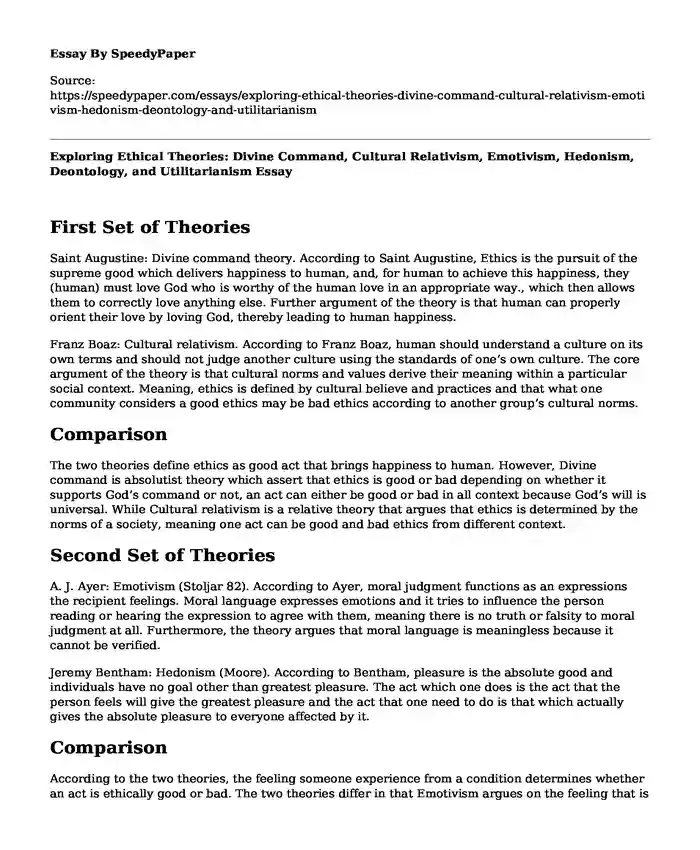
| Type of paper: | Essay |
| Categories: | Philosophy Ethics |
| Pages: | 3 |
| Wordcount: | 701 words |
First Set of Theories
Saint Augustine: Divine command theory. According to Saint Augustine, Ethics is the pursuit of the supreme good which delivers happiness to human, and, for human to achieve this happiness, they (human) must love God who is worthy of the human love in an appropriate way., which then allows them to correctly love anything else. Further argument of the theory is that human can properly orient their love by loving God, thereby leading to human happiness.
Franz Boaz: Cultural relativism. According to Franz Boaz, human should understand a culture on its own terms and should not judge another culture using the standards of one’s own culture. The core argument of the theory is that cultural norms and values derive their meaning within a particular social context. Meaning, ethics is defined by cultural believe and practices and that what one community considers a good ethics may be bad ethics according to another group’s cultural norms.
Comparison
The two theories define ethics as good act that brings happiness to human. However, Divine command is absolutist theory which assert that ethics is good or bad depending on whether it supports God’s command or not, an act can either be good or bad in all context because God’s will is universal. While Cultural relativism is a relative theory that argues that ethics is determined by the norms of a society, meaning one act can be good and bad ethics from different context.
Second Set of Theories
A. J. Ayer: Emotivism (Stoljar 82). According to Ayer, moral judgment functions as an expressions the recipient feelings. Moral language expresses emotions and it tries to influence the person reading or hearing the expression to agree with them, meaning there is no truth or falsity to moral judgment at all. Furthermore, the theory argues that moral language is meaningless because it cannot be verified.
Jeremy Bentham: Hedonism (Moore). According to Bentham, pleasure is the absolute good and individuals have no goal other than greatest pleasure. The act which one does is the act that the person feels will give the greatest pleasure and the act that one need to do is that which actually gives the absolute pleasure to everyone affected by it.
Comparison
According to the two theories, the feeling someone experience from a condition determines whether an act is ethically good or bad. The two theories differ in that Emotivism argues on the feeling that is received from the outcome of an occurrence, while hedonism argues from the feeling that influence the occurrence of an event.
Third Set of Theories
Immanuel Kant: Deontology (Darwell). According to Kant, an action is considered morally good or bad using the characteristics of the action and not by the outcome of the action. Some occurrences are morally obligatory regardless of the outcome they present to the welfare of human. There is nothing good without qualification except a positive will, and a positive will is one that is determined to act in respect to the moral law and out of regard for the law rather than out of natural influences.
John Stuart Mill: Utilitarianism (Mill and Sher).According to mill, only those actions that brings happiness are good and those that brings unhappiness are bad. Also, everyone strive for happiness because being happy without any pain is the sole basis of morality. Furthermore the theory identify that happiness and pleasure can differ in quality and quantity, and that the pleasure that an individual regards higher than the other should be weighted more heavily when determining whether an act is good or bad.
Comparison
The two theories differ in that deontology used the law and the intentions of an act while utilitarianism used the feeling of an individual to determine the ethial goodness of an act. Utilitarianism is based on the person performing the act while deontology is based on the law.
Works Cited
Darwell, Stephen. Deontology. Wiley-Blackwell, (2008).
Mill, John S., and Sher, George. Utilitarianism, 2nd ed., Hackett Publishing, (2002).
Moore, Andrew. Hedonism. The Stanford Encyclopedia of Philosophy. (2004).
Solomon et al. Introducing Philosophy: A Text with Integrated Readings. New York: Oxford UP, 2020. Print.
Stoljar, Daniel. Emotivism and truth conditions. Philosophical Studies 70.1 (1993): 81-101.
Cite this page
Exploring Ethical Theories: Divine Command, Cultural Relativism, Emotivism, Hedonism, Deontology, and Utilitarianism. (2023, Dec 30). Retrieved from https://speedypaper.net/essays/exploring-ethical-theories-divine-command-cultural-relativism-emotivism-hedonism-deontology-and-utilitarianism
Request Removal
If you are the original author of this essay and no longer wish to have it published on the SpeedyPaper website, please click below to request its removal:
- Kant and Mill in the Free Philosophy Essay Sample
- Essay Example on Liberalism and Realism in the Movie Dr. Strangelove
- Philosophy Essay Sample on the Ontological Argument: Objective and Subjective Reflection
- Paper Example on Use of Anonymous Free Speech on the Internet With Kant's Theory
- Essay Example on Death and Dying
- Free Essay. Death with Dignity and Green Burial
- Essay Example: The Evolution of Moral Philosophy and its Effects on Human Freedom
Popular categories




